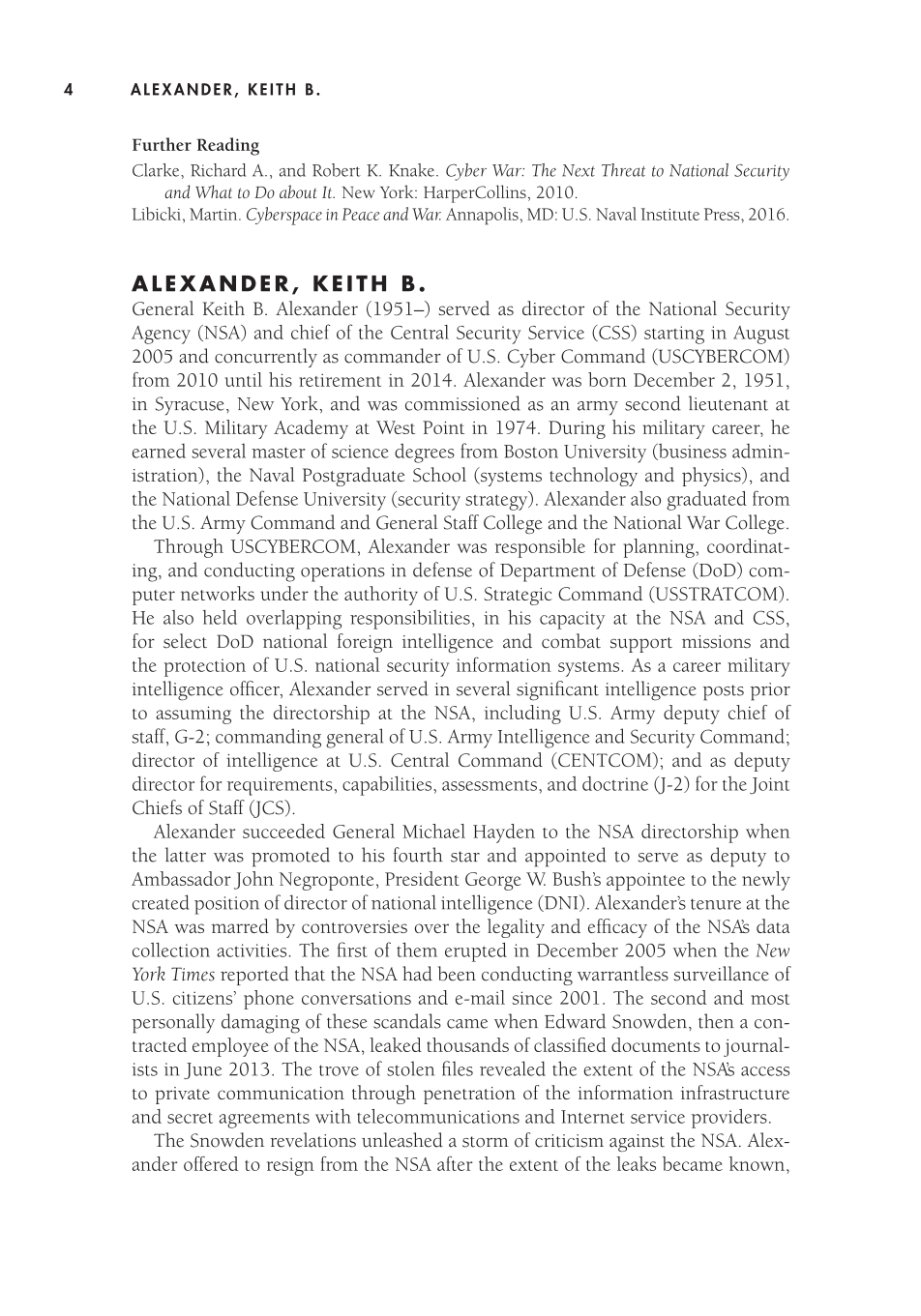Alexander, Keith B. 4
Further Reading
Clarke, Richard A., and Robert K. Knake. Cyber War: The Next Threat to National Security
and What to Do about It. New York: HarperCollins, 2010.
Libicki, Martin. Cyberspace in Peace and War. Annapolis, MD: U.S. Naval Institute Press, 2016.
ALEXANDER, KEITH B.
General Keith B. Alexander (1951–) served as director of the National Security
Agency (NSA) and chief of the Central Security Service (CSS) starting in August
2005 and concurrently as commander of U.S. Cyber Command (USCYBERCOM)
from 2010 until his retirement in 2014. Alexander was born December 2, 1951,
in Syracuse, New York, and was commissioned as an army second lieutenant at
the U.S. Military Academy at West Point in 1974. During his military career, he
earned several master of science degrees from Boston University (business admin-
istration), the Naval Postgraduate School (systems technology and physics), and
the National Defense University (security strategy). Alexander also graduated from
the U.S. Army Command and General Staff College and the National War College.
Through USCYBERCOM, Alexander was responsible for planning, coordinat-
ing, and conducting operations in defense of Department of Defense (DoD) com-
puter networks under the authority of U.S. Strategic Command (USSTRATCOM).
He also held overlapping responsibilities, in his capacity at the NSA and CSS,
for select DoD national foreign intelligence and combat support missions and
the protection of U.S. national security information systems. As a career military
intelligence officer, Alexander served in several significant intelligence posts prior
to assuming the directorship at the NSA, including U.S. Army deputy chief of
staff, G-2; commanding general of U.S. Army Intelligence and Security Command;
director of intelligence at U.S. Central Command (CENTCOM); and as deputy
director for requirements, capabilities, assessments, and doctrine (J-2) for the Joint
Chiefs of Staff (JCS).
Alexander succeeded General Michael Hayden to the NSA directorship when
the latter was promoted to his fourth star and appointed to serve as deputy to
Ambassador John Negroponte, President George W. Bush’s appointee to the newly
created position of director of national intelligence (DNI). Alexander’s tenure at the
NSA was marred by controversies over the legality and efficacy of the NSA’s data
collection activities. The first of them erupted in December 2005 when the New
York Times reported that the NSA had been conducting warrantless surveillance of
U.S. citizens’ phone conversations and e-mail since 2001. The second and most
personally damaging of these scandals came when Edward Snowden, then a con-
tracted employee of the NSA, leaked thousands of classified documents to journal-
ists in June 2013. The trove of stolen files revealed the extent of the NSA’s access
to private communication through penetration of the information infrastructure
and secret agreements with telecommunications and Internet service providers.
The Snowden revelations unleashed a storm of criticism against the NSA. Alex-
ander offered to resign from the NSA after the extent of the leaks became known,
















































































































































































































































































































































































































